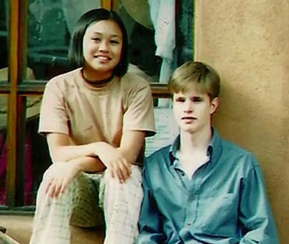On the 15th anniversary of his murder, the crime still resonates

Courtesy of Michele Josue
Beth Loffreda had just moved from New Jersey to teach at the University of Wyoming when Matthew Shepard was murdered on October 6, 1998.
Shepard, a 22-year-old student at the school, was viciously beaten by two local men, then lashed to a fence and left to die. He was targeted, apparently, because he was gay.
Loffreda, a Rutgers alumna, never met Shepard, but she became fascinated by the crime’s impact on the town of Laramie and the nation. Shepard’s murder became one of the first high-profile crimes to raise awareness of homophobic violence and a symbol in the battle for gay rights. It resulted in 2009 hate crime legislation named for Shepard, along with plays, songs and films about his life and death.
The tragedy inspired Loffreda to write the book Losing Matt Shepard: Life and Politics in the Aftermath of Anti-Gay Murder, published in 2001. “I was struck that so many people felt so attached to the story,’’ says Loffreda. “Why Matt? Why this crime? It’s an interesting question about how social change happens.’’
Loffreda will be part of the conversation at an October 14 screening of the documentary Matt Shepard is a Friend of Mine, directed by filmmaker Michele Josue, a high school friend of Shepard’s, and produced by fellow Rutgers alumna Arleen McGlade. The event will be presented by the Tyler Clementi Center at Rutgers, which focuses on research and education that helps young adults in the digital era navigate transitions in their lives. The program marks the 15-year anniversary of Shepard’s death.

Courtesy of Beth Loffreda
While Loffreda’s book is about the ripple effect of Shepard’s murder -- in Laramie and beyond -- McGlade and Josue’s, film, released last month, presents an intimate portrait of Shepard, told through interviews with his friends.
Not long before his murder, Shepard, who attended a private high school in Switzerland, was a first-year student adjusting to college life at the University of Wyoming. Loffreda had just become a faculty advisor to the student LGBT club, despite the fact that she’s straight. Fifteen years ago there was only one openly gay faculty member at the school. Her interest in LGBT issues began at Rutgers, says Loffreda, who grew up in Audubon, Pa. “Rutgers was a place where some really useful thinking about gender and sexuality was going on. Being in the midst of that was really good for me. It made it possible for me to write the book.”
In 1998, LGBT issues and gender identity were becoming part of the national conversation, and Shepard’s murder was a shocking example of the brutality inflicted upon the LGBT community, says Loffreda. It generated a wave of national sympathy that, at the time, was unprecedented for LGBT crime victims. The fact that Shepard was a white, middle class young man undoubtedly helped focus attention on the crime, says Loffreda, who teaches courses in writing and queer studies. But it was also because, in widely published photos, Shepard appeared so vulnerable. With shaggy blonde hair and a melancholy smile, he stood 5’4 and weighed only 100 pounds.
“He looked so young and sweet,’’ she says. “And although anti-gay murders are typically characterized by terrible violence, his murder was especially horrific. He was out on the prairie, tied to a fence in the terrible cold and left there for more than a day. The murder humanized him even for people who didn’t think of gay people as fully human.’’
Program Kicks Off RU-Ally Week
The Matthew Shephard program comes at the start of RU Ally Week, sponsored by the Rutgers Center for Social Justice Education and LGBT Communities, which encourages straight people to support LGBT rights. “We’re interested in how the story gets remembered. What gets remembered? How? And for whom?’’ says Rick Lee, the Tyler Clementi Center’s associate director, who teaches courses on LGBT culture, AIDS literature, and Asian American Studies. “We wanted to explore how people are thinking about his death 15 years later.’’
Lee is also curious about students’ perceptions of the case. “They were so young when it happened. Due to increased visibility of LGBT people and the debates over marriage equality, many people, young and old, respond with, ‘oh things are so much better. This kind of thing isn’t happening now.’ We want them to understand that this kind of violence is still going on and legalization of gay marriage doesn’t take homophobia off the table.’’
An excerpt from Loffreda’s book is included in The New Humanities Reader, and many “Expository Writing 101" instructors have assigned the text as required reading for their students.
Although Shepard’s murder has become synonymous with homophobia, a new book by Stephen Jiminez, a gay journalist who spent years researching the case, presents evidence that the killing was largely motivated by drugs. According to The Book of Matt, Shepard may have been dealing meth. Jiminez also quotes Laramie residents who claim Shepard and his killers had previous sexual encounters. But some critics have denounced the book for relying too heavily on anonymous sources.
Loffreda hasn’t read The Book of Matt. But she believes that even if Shepard wasn’t killed solely because he was gay, that was part of the motive.“His possible involvement with drugs doesn’t mean that homophobia wasn’t also a spur,’’ she says.”Much about that night is lost to us because Matt is lost.”
Both The Book of Matt, and Matt Shepard is a Friend of Mine, are proof that Shepard's death continues to resonate today. “I think there is still much to learn from what happened to him and what happened in the aftermath,’’ says Loffreda. “Clearly there is a desire to keep telling these stories and explore what they mean.’’